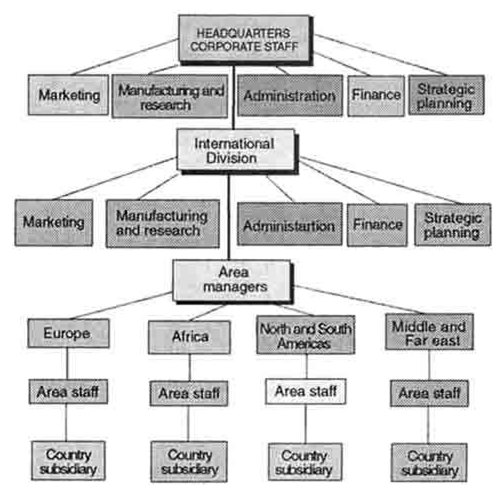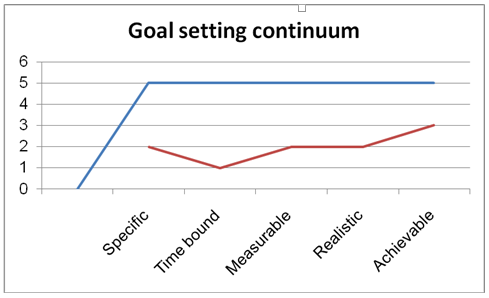Organizational structure
According to Hamilton (1999), lack of an organizational structure leads to loss of organizational culture. This aspect arises from the fact that organizations can nurture strong operational practices amongst its workforce. In the course of its operation, the Coca Cola Company has adopted a hierarchical organizational structure. The organizational structure constitutes several departments such as the marketing department, administration department, research and development department [manufacturing and research], finance department, and strategic planning department.

Comparison of the manager’s goal setting and personal organization
Goal setting should occur effectively to achieve the intended outcome (Daft & Marcic 2013). Goal-setting skills vary across individuals. Some individuals are very effective in setting and implementing goals while others are not, which explains the existence of differences in organizational performance. In a bid to be effective in setting goals, individuals need to ensure that the set goals are specific, time-bound, realistic, achievable, and measurable.
The extent to which the set goals possess these characteristics determines their effectiveness. Organizational managers are more effective in setting goals compared to students. Their effectiveness in goal setting arises from the fact that they have to ensure that the set goals align with changes in the internal business environment.
The set goals should be specific by focusing on a particular outcome. The time-bound characteristic arises from the fact that they should be attained within a particular period. The element of time ensures that the goals achieve the intended result. The goal has to be realistic in a bid to stimulate one to stick with it. In most cases, individuals tend to deviate from unrealistic goals. The goal should also be attainable.
By using these parameters, it is easy to assess one’s effectiveness in setting goals. The continuum below illustrates a comparison of my goal setting ability with that of the Coca Cola Company research and development manager based on these elements. The goal setting ability is measured on a scale of 1 to 5 where 1= ineffective and 5= highly effective. From the chart, it is evident that the manager is very effective and consistent in goal setting.

The managers’ view on personal and organizational goal setting about his position
Goals constitute an important element in organizations. Consequently, the process of goal setting focuses on increasing an organization’s efficacy in attaining the desired outcomes in organizations, teams, or individually (Laton 2006). The development of an effective goals setting technique improves the returns received. In the course of executing his duties, the manager has developed a positive perception regarding personal and organizational goal setting.
Firstly, the manager thinks that goal-setting contributes towards the development of a clear understanding of the direction to take to respond to changes emanating from the micro and macro business environment. In the 21st century, the business environment has become very challenging. Some factors that have led to this transformation relate to changes in consumer tastes and preferences, increment in the intensity of competition, and a high rate of technological innovation. As one of the organization’s top executives, the Research and Development manager appreciates the importance of formulating goals and transforming them into reality.
Consequently, the positive perception of the importance of goal setting developed has enabled the manager to be proactive in responding to market changes. Additionally, his response to changes has played a critical role in ensuring that the firm develops and maintains market leadership. The effectiveness with which the Research and Development manager can conduct market research has played a critical role in identifying market gaps.
As the head of the firm’s research and development department, the research and development manager can set goals that align with the firm’s overall goal of maintaining market leadership. One of the ways through which the Research and Development manager attains this goal is by ensuring that the entire market research process follows goals that focus on the most important market variables such as consumers and competitors. Thus, the firm can develop products that appeal to the total market. For example, an effective goal setting enables the Research and Development manager to ensure that the products produced do not fail when introduced in the market. The firm ensures this aspect by integrating consumers’ tastes and preferences.
The high regard for effective goal setting held by the research and development manager also hinges on the fact that the Research and Development team allows the firm to deal with intense competition in the soft drink industry. In a bid to attain a high level of effectiveness and efficiency in goal setting, the manager ensures that comprehensive researches on aspects directly affecting the firm’s competitiveness are adequately addressed (Daft 2010).
According to the manager, the global soft drink industry is increasingly becoming very competitive due to its lucrative nature. New entrants are venturing into the industry to exploit the market opportunity presented.
Therefore, to deal with this challenge, the research and development manager ensures that the research conducted takes into account the competitors’ interests. In the process of setting the goal, the research and development manager ensures that all the strong points associated with the competitor are adequately addressed. The first element taken into consideration relates to the competitors’ strong points. In his opinion, the entire goal-setting process has to align with the organization’s mission and vision. The manager thinks that this aspect has played a critical role in enhancing the organization’s ability to exploit market opportunities.
The manager thinks that effective goal setting will contribute towards an increment in the probability of having promotion given that the firm will attain a high level of profitability through the products introduced into the market. The manager is also of the opinion that the success of organizations in the soft drink industry is dependent on the degree with which its products gain market acceptance.
In addition to enhancing organizational success, the manager asserts that goal setting is a vital consideration in one’s pursuit to attain a high level of personal and professional development. This assertion arises from the fact that the manager will be ranked based on the quality of the decisions made.
Discussion on how the manager’s goal setting and organizational skills are suited to the nature of their work requirements
The organizational skills possessed by the research and development manager forms the basis of an organization’s success in its research and development. According to Mohanty (2008), projects are an important element in organizations’ research and development. A particular research and development project may constitute hundreds of tasks to be undertaken. Consequently, the development of effective organizational skills such as time management, prioritization, ability to overcome setbacks, planning skills, and stress management amongst others is vital.
Prioritization skills ensure that tasks are undertaken by their level of importance. This aspect ensures that there is no wastage of resources due to poor organization of tasks, which leads to the attainment of the desired results. Prioritization of the research and development projects being undertaken contributes towards the organization is effective in exploiting market opportunities (Firesmith 2004).
Moreover, planning constitutes important organizational skills in research and development (Daft, Kendrick & Vershinina 2010). This element arises from the fact that it aids in ensuring that the necessary resources and requirements are incorporated to achieve the set organizational goal. The incorporation of effective planning skills by research and development managers also contributes towards the development of a high level of coherence amongst team members.
This aspect emanates from the fact that the manager can form strong project teams characterized by a high level of coherence and participation of team members. Consequently, the team members can interact and exchange information necessary for attaining the overall goal. According to Kanji and Greenwood (2001), developing a high level of coherence amongst project team members is important in attaining a high level of synergy.
To achieve their goals, it is a requirement for projects to be completed within the set period. Therefore, possessing time management skills is critical. Time management skills will allow the organization to become effective in exploiting market opportunities because opportunities have a short window.
Reference List
Carter, S 1998, Global Agricultural Marketing Management. (Marketing and Agribusiness texts – 3, Food & Agriculture Organisation of the United Nations, Rome.
Daft, R 2010, Organisational theory and design, Cengage, Mason, Ohio.
Daft, R, Kendrick, M & Vershinina, N 2010, Management, Cengage, Andover.
Daft, R & Marcic, D 2013, Understanding management, South-Western, Ohio.
Firesmith, D 2004, ‘Prioritising requirements’, Journal of Object Technology, vol. 3 no. 8, pp. 35-47.
Hamilton, M 1999, Software development: building reliable systems, Prentice-Hall, New Jersey.
Kanji, N & Greenwood, L 2001, Participatory approaches to research and development in IIED: Learning from experience, International Institute of Environmental Development, London.
Laton, D 2006, Developing positive workplace skills and attributes, Lulu.com, London.
Mohanty, R 2008, Quality management practice, Excel Books, New Delhi.